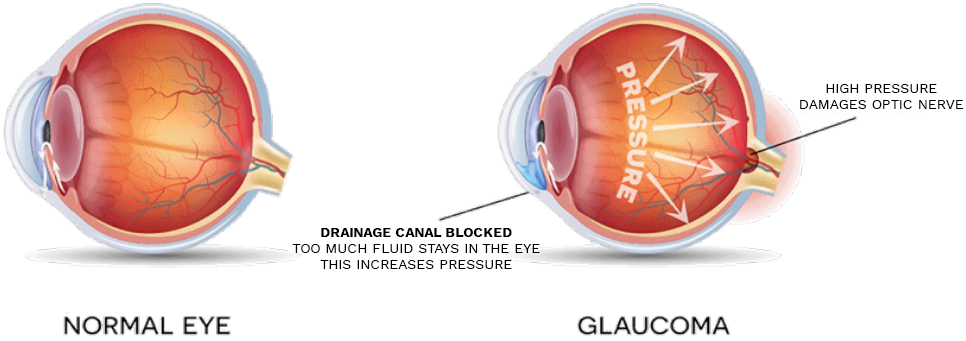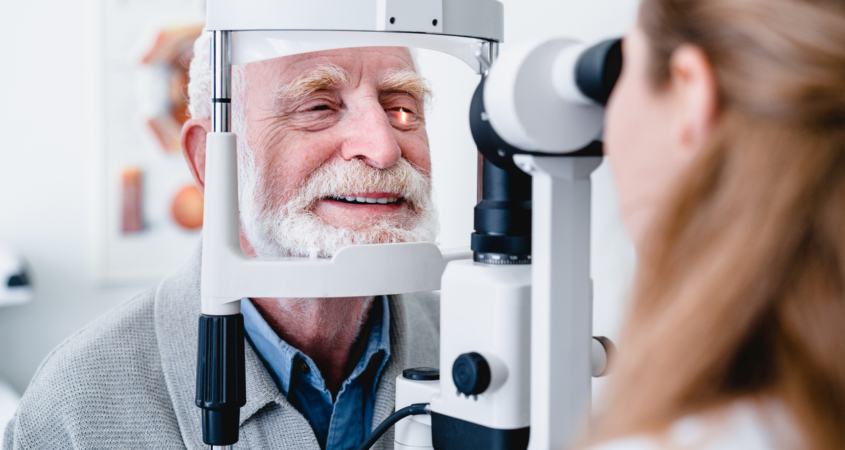Glaucoma and Genetics: Understanding Your Risk
Glaucoma can affect anyone, but having a family member with the condition elevates your risk. Additionally, genetics play a crucial role in the onset of certain glaucoma types that occur before the age of 40.
Glaucoma is a serious eye condition primarily known for its potential to cause loss of vision. It arises due to damage to the optic nerve, largely from an increase in pressure within the eye. Symptoms often go unnoticed until the condition has advanced, making glaucoma a sneaky thief of sight. Here at Visionary Eye Doctors, we understand that our patients are seeking answers to some critical questions regarding this condition, the most pertinent being – is glaucoma hereditary?
Through this blog post, we intend to answer this question, shed light on the relationship between genetics and glaucoma, and ultimately help you understand if you are at risk. Our goal is to provide you with reliable, scientifically backed information so you can take proactive steps in managing your eye health. Armed with decades of experience and a deep understanding of this complex disease, the team of specialists at Visionary Eye Doctors is ready to guide you through this labyrinth of information.
Join us as we explore this eye condition intensely, aiming to clarify your doubts, assuage your fears, and help you evaluate your risk. By understanding the hereditary nature of glaucoma, you’ll be more armed in the fight against this silent vision thief. The pathway to better vision care might start with a series of professional eye exams. Still, it extends much further into understanding your genetic predisposition and how that could translate into practical preventive measures. So, let’s take that first step together and unveil the mysteries of glaucoma.
Understanding Glaucoma

Understanding glaucoma begins with understanding its types, symptoms, and how it could potentially affect your life. Two common types of glaucoma are open-angle glaucoma, which is usually chronic and more common, and acute angle-closure glaucoma, a less frequent. Still, they might lead to a sudden increase in intraocular pressure.
In open-angle glaucoma, despite the normal appearance of the structures of the eye, the fluid does not flow properly through the eye’s drainage area, also known as the trabecular meshwork. Angle-closure glaucoma, on the other hand, is often triggered by a narrow drainage angle formed between the iris and cornea, causing poor drainage and a potential sudden spike in eye pressure.
One aspect that makes glaucoma particularly tricky to deal with is its symptoms – or, quite often, the lack of them. Symptoms of glaucoma usually begin by causing subtle loss of peripheral vision, which people fail to notice. As the condition progresses, these blind spots might start encroaching upon the central vision. Therefore, without regular eye exams, one may remain oblivious to the onset of the condition.
Glaucoma is unfortunately synonymous with optic nerve damage. The extra fluid that builds up in the front part of your eye increases intraocular pressure, indirectly leading to damage to the optic nerve – the cable that connects your eye to your brain. This optic nerve damage can eventually lead to vision loss, making early detection and appropriate intervention indispensable.
Understandably, the key to thwarting severe vision loss from glaucoma lies in its early detection. According to the American Glaucoma Society, regular and comprehensive eye exams serve as the primary armor against this silent enemy. Comprehensive eye exams not only examine the health of your eyes but also measure changes in the visual field, ensuring that any loss of peripheral vision is promptly detected. As experts in the field of ophthalmology, the specialists at Visionary Eye Doctors highly recommend these regular check-ups. Our mission is to help our patients navigate the often tricky path of eye health, and catching glaucoma early is a crucial part of this journey.
Genetic Factors and Glaucoma
A common concern that most people have when they think of glaucoma is: “Could I inherit glaucoma from my family members?”. The underlying fear is understandable. After all, the knowledge of a family history of glaucoma can drastically influence your perceptions regarding your eye health.
While it’s crucial to note that having a family member with glaucoma doesn’t guarantee that you’ll develop the condition, it does indicate a higher risk factor. In fact, according to the Glaucoma Research Foundation, your risk of developing glaucoma escalates by 4 to 9 times if you are in the immediate family – parent, sibling, or child – of someone with glaucoma.
Certain forms of glaucoma, such as primary congenital glaucoma, which affects babies and young children, typically show a stronger direct hereditary link. Similarly, early onset glaucoma, which impacts young adults, may also demonstrate strong inheritance patterns. In such cases, an early comprehensive eye exam becomes even more important, allowing for timely detection and intervention.
Conversely, it’s important to remind ourselves that glaucoma is not exclusively a hereditary condition. Several other factors like age, race, and certain medical conditions like diabetes also contribute to the risk of developing glaucoma. Moreover, statistically, glaucoma affects more individuals without a family history of the disease across populations.
For example, open-angle glaucoma affects a significant percentage of African Americans over the age of 40 and older people in general. The reason behind this higher incidence rate isn’t entirely genetic. It might be associated with environmental factors or concurrent health issues like hypertension or diabetes.
In essence, while genetics plays a crucial role in determining glaucoma risk, it’s only one of several influential factors. A genetic predisposition does not automatically equate to a confirmed diagnosis. It merely stresses the importance of exercising caution, scheduling regular visits with your eye doctor, and staying abreast of changes in your vision or eye health. The team at Visionary Eye Doctor is here to support you on this journey, providing expert guidance, knowledge, and comprehensive eye health services.
Managing and Treating Glaucoma

While receiving a diagnosis of glaucoma can be daunting and nerve-wracking, the good news is that glaucoma, even when hereditary, can be effectively managed and treated to prevent or slow down vision loss. Here at Visionary Eye Doctors, we are deeply committed to providing a variety of sophisticated and effective treatment options for glaucoma.
The management of glaucoma typically begins with the application of prescription eye drops that help control intraocular pressure. Using these eye drops following the doctor’s instructions is critical in managing the condition.
In some advanced cases or situations where the patient’s eye fails to respond to eye drops, a surgical approach might be recommended. Traditionally, surgical intervention for glaucoma was seen as complex and invasive, with the potential for significant postoperative recovery and complications. However, with advancements in technology, safer and less invasive surgical alternatives are now available to patients.
One game-changing technique in glaucoma treatment is the Micro-Invasive Glaucoma Surgery (MIGS). MIGS is a highly effective, minimally invasive surgical technique that seeks to reduce intraocular pressure by enhancing the drainage of fluid (aqueous humor) from the eye. Its popularity among eye care professionals and patients is owed to its high success rates, fewer complications, and less demanding recovery times compared to traditional glaucoma surgery.
Another impressive leap in the technology of glaucoma treatments has been the development of the iStent inject®, the smallest medical device known to be implanted in the human body. Offering a dual solution for patients with cataracts and glaucoma, these tiny stents are strategically inserted in the eye’s drainage system during the cataract surgery. This preventative approach aids in restoring the eye’s natural fluid outflow, thereby controlling intraocular pressure.
To round off our extensive portfolio of glaucoma treatments, we offer a few more techniques in specific cases such as selective laser trabeculoplasty (SLT) for stimulating the eye’s drainage system, trabeculectomy, or shunt placement for facilitating fluid drainage.
Never forget that early diagnosis and intervention remain the most effective strategies to manage glaucoma effectively. So, don’t defer your regular check-ups, and continue to preserve your vision with Visionary Eye Doctors.
Visionary Eye Doctors: Your Glaucoma Experts
We’ve journeyed together through the complexities of glaucoma, examining its types, symptoms, and genetic predispositions along the way. It’s clear now that while family history is a significant risk factor for glaucoma, it is not a guaranteed determinant. Glaucoma can be influenced by an array of different factors, including age, race, and certain medical conditions.
Navigating the world of genetic risk can feel daunting, and understanding one’s personal risk can be intricate and emotional. However, be assured that a genetic risk is not equivalent to a certain destiny. Early detection remains the most powerful weapon against glaucoma, and a proactive approach toward regular eye exams is the first step in cushioning this silent vision thief’s impact.
At Visionary Eye Doctors, we’re committed to providing personalized and comprehensive eye care to our patients. Our dedicated team is well-versed in providing a range of effective treatment options for glaucoma, even for those with a hereditary risk. We are here to guide you through every step of the journey – right from understanding your genetic predisposition, and early detection of any eye problems, to providing cutting-edge treatments.
Remember the power of knowledge and proactive choices in looking after your eye health. When it comes to glaucoma, don’t hesitate to get regular eye checks, learn your family’s eye health history, and consult with eye care professionals if you are at risk or notice any vision changes.
Choose to see with clear vision, choose to protect your eyes, and choose to put your trust in our expert care at Visionary Eye Doctors. We look forward to being a part of your journey to optimal eye health. Please contact us today to schedule a consultation. Knowledge is power, and the path to better eye health begins here.



